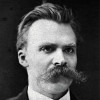“ in every department science needs an ideal value, a power which creates values, and in whose service it can believe in itself—science itself never creates values. ”
Friedrich Nietzsche, On the Genealogy of Morality (1887). copy citation
| Author | Friedrich Nietzsche |
|---|---|
| Source | On the Genealogy of Morality |
| Topic | science power |
| Date | 1887 |
| Language | English |
| Reference | |
| Note | Translated by Horace B. Samuel |
| Weblink | https://en.wikisource.org/wiki/The_Genealogy_of_Morals |
Context
“You can't get round me with science, when I search for the natural antagonists of the ascetic ideal, when I put the question: "Where is the opposed will in which the opponent ideal expresses itself?" Science is not, by a long way, independent enough to fulfil this function; in every department science needs an ideal value, a power which creates values, and in whose service it can believe in itself—science itself never creates values. Its relation to the ascetic ideal is not in itself antagonistic: speaking roughly, it rather represents the progressive force in the inner evolution of that ideal. Tested more exactly, its opposition and antagonism are concerned not with the ideal itself, but only with that ideal's outworks, its outer garb, its masquerade, with its temporary hardening, stiffening, and dogmatising—it makes the life in the ideal free once more, while it repudiates its superficial elements.”
source


